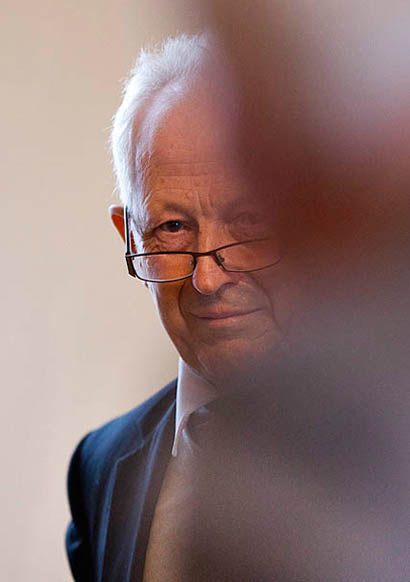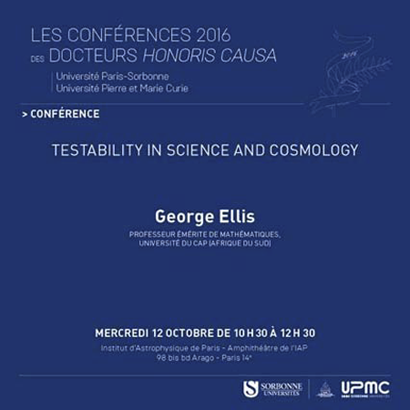PROFESSOR GEORGE ELLIS IS MADE DOCTOR HONORIS CAUSA OF THE UNIVERSITY PIERRE AND MARIE CURIE ON OCTOBER 11th 2016.

George Ellis at “The Causal Universe 16th Kraków Methodological Conference”
© Adam Walanus
George Ellis is not only a world-renowned scientist, a pioneer of modern cosmology, but also a humanist who has been deeply involved in the social and political evolution of his country, South Africa, since the 70s.
George Ellis, professor emeritus at the University of Cape Town, was born in Johannesburg. He obtained his Masters in Physics in 1960 at the University of Cape Town, before going to Cambridge where he obtained his PhD in 1964. After ten years at Cambridge, he was appointed professor of applied mathematics at the University of Cape Town until 1988, and then professor of cosmology at Scuaola Internatiozionale Superiore di Studi Avanzati in Trieste in Italy for five years, before returning to Cape Town permanently.
George Ellis is first of all a specialist of the theory of general relativity and its cosmological applications. Alongside Steven Hawking and Roger Penrose, among others, he participated in the renewal of general relativity in the 70s. In 1973, he published "The large scale structure of space-time" in collaboration with Stephen Hawking, one of the first books on relativistic cosmology whose methods significantly changed the development of this area. Considered one of the greatest experts of relativistic cosmology, his work has clarified the notion of singularity and geometric properties of cosmological solutions of general relativity. In particular, in 1961, he gave a proof of a conjecture of Kurt Gödel. More recently, his critical analysis of multiverse ideas and Hawking radiation positions him as one of the most influential figures of the community. His work has been crowned with numerous international awards, and, from 1989 to 1992, he was the president of the lnternational Society on General Relativity and Gravitation.
The members of the Institut d'Astrophsyique de Paris are very honored to have George Ellis as a regular collaborator of the Institute, and this for over 15 years. Various student and post-docs exchanges were set up. This connection between the IAP and the most visible group in South Africa is also quite strategic, at a time when astrophysics is booming (including the opening of the SALT—the South African Large Telescope—and construction of SKA radio telescope) and requires training many students. UPMC researchers are directly involved in the implementation of AIMS centers—the African Institute for Mathematical Science—the first of which was founded in the suburbs of Cape Town.
However, beyond his research in general relativity, George Ellis is also a political activist, in the best sense, as he is deeply involved in the political and social life of his country.

Since the 70s, George Ellis has indeed been an active opponent of the apartheid regime. After his return to South Africa he was involved in the analysis of urban problems, quality of life and poverty, and especially education and research for the new South Africa. Thus he authored the report on science policy that became the basis of the science policy of the Mandela Government. He has worked actively for access to housing and education for all. More recently, he founded the "New South Africa Vision Project" which was the starting point for the "Township Employment Project." Alongside his analysis and expert recommendations to the government, and speaking out in the national media, George Ellis is involved with various local associations, such as the "Friends of the Ciskei People." His involvement in political and social life is widely recognized in South Africa. In 1999, he received the Star of South Africa Medal from President Nelson Mandela and in 2006, the Order of Mapungubwe from President Thabo Mbeki.
In awarding this honorary doctorate, the UPMC celebrates the contributions of George Ellis in general relativity and cosmology, but also as a humanist whose political and social actions have influenced his country in a sensitive phase in its history. His humanity, modesty, the independence, wealth, and freedom of his thoughts make him a truly honest man, a scientist appreciated by his peers and an example for us all.
To celebrate this award, George Ellis was invited to give a seminar: “Testability in Science and Cosmology”, in the IAP's amphitheater, on Wednesday, Octobre 12th, from 10:30 to 12:30. The video presentation of this conference is visible here.
October 2016
